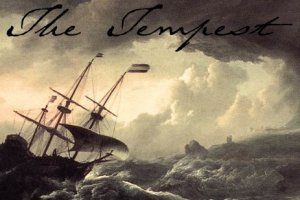 A new app recently developed by Luminary Digital Media is just now starting to make waves. The premise is simple: taking Shakespeare’s “The Tempest”, the inventors developed a means by which digital copies of the original text can be readily found and read. For example, say the instructor tells you and the classroom:
A new app recently developed by Luminary Digital Media is just now starting to make waves. The premise is simple: taking Shakespeare’s “The Tempest”, the inventors developed a means by which digital copies of the original text can be readily found and read. For example, say the instructor tells you and the classroom:
“Good morning, class. I’d like you all to open your books to Act I, Scene 2, Line 398.”
“Usually there’s a whole lot of shuffling,” says Bryn Mawr professor Katharine Rowe. But not if the class is using an app she and Notre Dame professor Elliott Visconsi built. In their app of Shakespeare’s Tempest students can just enter “1.2.398” and be transported there immediately. Or, alternatively, search for the words: “Full fathom five thy father lies.”
That tool “gets my students on the line, at the same time, almost instantly. That’s a big deal for a Shakespeare prof,” she says. “We get our brains faster into the text that way.”
And that’s not all:
And this is just a simple search. The features of their Tempest app go far, far beyond search. Readers can listen to actors perform the script (and the text will scroll along as they do). For key passages, they can compare a set of alternative theatrical interpretations. They can see expert commentaries embedded in the text’s margins. Teachers can leave their own comments and questions for their students. Students can respond, ask questions, and chat about the text. It is a fully realized digital book, an embodiment of a pedagogy that values interaction between a reader and an author and among readers themselves. “It’s premised on the idea that you learn best when you create,” Visconsi told me.
It’s this not just another Kindle / Nook or whatever reading tool / app: it’s another way of experiencing works that previously were not easily enjoyed:
With the ability to embed actors’ interpretations, the app is well-suited for other plays, but the hope is that they can expand it beyond drama to novels, essays (“of course, the form of the essay is itself an intensely social genre” Rowe says), and religious texts, which, because of their long history of commentary and debate, really stand to benefit from the way the app incorporates other scholarly perspectives.
So it’s more than just a helpful app for the college student and professor:
The most immediate value of their work lies in the greater understanding and enjoyment students of The Tempest will gain in reading the play on their app. But at least one professor in Denmark has another reason for bringing it into the classroom: as a primary source for a course on apps as the next generation of classic literature, looking at how they are rewriting, or, at least, revisiting classic texts. In part because such texts tend to be public domain and therefore available for innovation, these older texts are at the heart of contemporary innovation on what the book will become.
There are entire libraries of classics waiting for this application to come (“The Gallic Wars” by Julius Caesar or “The Satyricon” by Petronius come to mind). Finally, now there’s a way in which I can parse my copies of “War and Peace”,…
On the market / productive side, imagine the impact that this offers for technical manuals or documentation: we’re moving beyond just hyperlinks, we’re talking about a true enhancement for industry as well as for government. Most solutions offer, at best, a key word search or perhaps a phrase: if Visconsi and company does this right, they have a tool on hand that will revolutionize the way technical manuals and documentation is handled electronically.
And the application possibilities don’t stop there: proposals, specifications, plans, grants as well as contracts can readily use this approach.
Now let’s take this one step further: add a voice / speech control capacity / interface and we’re truly talking (!) about a great tool for both the average user and the advanced professional.
Guess there is a good value inherent with a humanities educational background, after all,…!
For more on this, read the following: